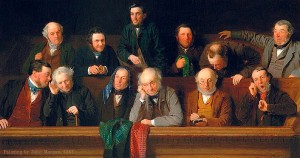Citizens have more power than they exercise. But folks in government aren’t exactly falling all over each other in the rush to help citizens participate and realize their potential.
Take juries. There are few more awesome responsibilities than sitting on a jury. And one of the things you can do, as a juror, is to refuse to follow the law or the judge, instead making your decision contrary to the immediate, official directive. Disapprove of a bureaucracy’s “legal” prosecution of an individual or group? Judge the law as well as the facts. Acquit.
Glenn Reynolds, writing in USA Today, shows that this practice has a long, honorable history in our country — he not unreasonably mentions how northern abolitionists fought the Fugitive Slave Act — and, if you, the juror, push it, “there’s nothing anyone can do about it…
Of course, prosecutors have essentially the same power, since they’re under no obligation to bring charges against even an obviously guilty defendant. But while the power of juries to let guilty people go free in the name of justice is treated as suspect and called “jury nullification,” the power of prosecutors to do the exact same thing is called “prosecutorial discretion,” and is treated not as a bug, but as a feature in our justice system.
Reynolds concisely makes the case that jury nullification is, itself, a designed feature of our American constitutional tradition, and not nearly so buggy as “prosecutorial discretion.”
Why? Its tendency is to liberate us from usurping government action.
Prosecutors’ “discretion” (on the other hand) gives folks in government more power over our lives. And ruins many.
This is Common Sense. I’m Paul Jacob.

